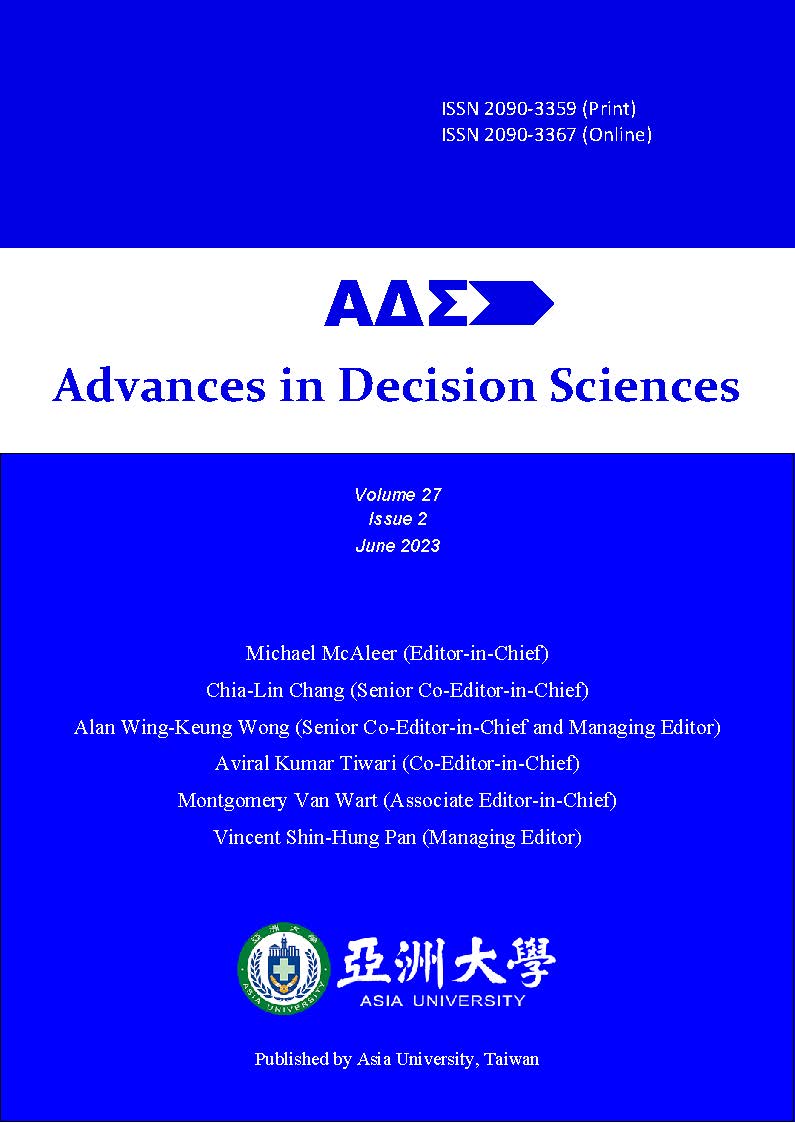Impact of Factors on Students' E-Learning Outcomes: Evidence from Pedagogical Universities in Vietnam with Applications in Decision Sciences
DOI:
https://doi.org/10.47654/v27y2023i2p28-45Keywords:
Decision Science in education, Fuzzy AHP, Generalized fuzzy numbers, E-Learning, Pedagogical UniversitiesAbstract
Purpose: In the modern era of technology, Decision Science plays a crucial role across various domains, including Education. As educational practices adapt to the challenges posed by the fourth industrial revolution and the Covid-19 pandemic, e-learning has emerged as a superior approach, as evident from numerous studies conducted across Europe and Asia, this study utilizes a widely recognized decision-making model to define the priority of the factors affecting the students’ e-learning outcomes at Pedagogical Universities in Vietnam.
Design/methodology/approach: The fuzzy analytic hierarchy process (AHP) approach, one of the most widely used multi-criteria decision-making approaches, is applied in this study. The study points out the limitations of Chang's (1996) fuzzy AHP approach and conducts a more comparative analysis by using the approach proposed by Hue et al. (2022). To do so, this study collects the data via in-depth interviews with lecturers and managers at Pedagogical Universities in Vietnam.
Findings: The findings in this study demonstrate that the dimensions of both "lecturers" and "students" have the most significant impact on students' e-learning outcomes at Pedagogical Universities in Vietnam, followed by system and technology, as well as course design and content. Specifically, within the lecturer dimension, Information, and communication technology skills (L2) and easy language communication (L3) play crucial roles and exert the strongest influence on students' e-learning outcomes. Conversely, within the student dimension, the most influential factors are students' motivation (S2) and self-learning ability (S6). Informed by Decision Science, a set of recommendations can be suggested for pedagogical universities aiming to enhance students' e-learning outcomes: (i) strengthen training and development programs for both lecturers and students, focusing on technology-related skills and effective teaching and learning methods; (ii) implement policies that incentivize lecturers and teachers to adopt innovative and positive teaching methods; (iii) develop blended learning models, invest in suitable equipment, and establish policies that encourage the creation of digital teaching materials; (iv) establish a clear roadmap and strategy for investing in equipment and online teaching infrastructure; (v) provide students with techniques to maintain focus, knowledge on maintaining a healthy balance during online learning, and self-learning abilities; (vi) carefully select appropriate courses to maximize the effectiveness of online learning, with a focus on theoretical subjects that require less practical or in-class calculation; and (vii) meticulously choose software that meets the specific requirements of each course and aligns with the existing educational infrastructure.
Originality/value: This study compares Chang’s (1996) and Hue et al.’s (2022) fuzzy AHP approaches to determine the critical factors impacting students’ e-learning outcomes in pedagogical universities in Vietnam. Four dimensions were considered: lecturer; students; course design and content; and system and technology. As far as we know, this study is the first paper to obtain the above-mentioned results in the literature.
Keywords: Decision Science in education, Fuzzy AHP, Generalized fuzzy numbers, E-Learning, Pedagogical Universities
References
Alhabeeb A. and Rowley J (2018). E-learning critical success factors: Comparing perspectives from academic staff and students. Computers & Education, 127, 1-12. https://doi.org/10.1016/j.compedu.2018.08.007
Abbasi S., Ayoob T., Malik A., and Memon S. I (2020). Perceptions of students regarding E-learning during Covid-19 at a private medical college. Pakistan Journal of Medical Sciences, 36:S57. https://doi.org/10.12669/pjms.36.COVID19-S4.2766
Alqahtani A. Y., and Rajkhan A. A. (2020). E-Learning Critical Success Factors during the COVID-19 Pandemic: A Comprehensive Analysis of E-Learning Managerial Perspectives. Education Sciences, 10(9), 216. https://doi.org/10.3390/educsci10090216
Allen I. E., and Seaman J. Growing by Degrees: Online Education in the United States, 2005. Wellesley, MA: Sloan Consortium (NJ1), 2006.
Akyüz H. İ., Aky¨uz, S. S. H. I., and Samsa, S. (2009). The effects of blended learning environment on the critical thinking skills of students. Procedia - Social and Behavioral Sciences, 1(1), 1744-1748. https://doi.org/10.1016/j.sbspro.2009.01.308
Baber H. (2020). Determinants of students’ perceived learning outcome and satisfaction in online learning during the pandemic of COVID-19. Journal of Education and E-Learning Research, 7(3), 285-292. https:// 10.20448/journal.509.2020.73.285.292
Bhuasiri W, Xaymoungkhoun O, Zo H, Rho J. J., Ciganek A. P. (2012). Critical success factors for e-learning in developing countries: A comparative analysis between ICT experts and faculty. Computers & Education, 58, 843-855.
Campbell T. A., and Campbell D. E. (1997). Faculty/student mentor program: effects on academic performance and retention. Research in Higher Education, 38, 727-742. https://doi.org/10.1023/A:1024911904627
Chang D. Y (1996). Applications of the extent analysis method on fuzzy AHP. European Journal of Operational Research, 3, 649-655. https://doi.org/10.1016/0377-2217(95)00300-2
Chirikov I., Shmeleva E., and Loyalka P. (2020). The role of faculty in reducing academic dishonesty among engineering students. Studies in Higher Education, 45, 2464-2480. https://doi.org/10.1080/03075079.2019.1616169
Chopra G., Madan P., Jaisingh P., and Bhaskar P. (2019). Effectiveness of e-learning portal from students’ perspective: A structural equation model (SEM) approach. Interactive Technology and Smart Education, 16(2), 94-116. https://doi.org/10.1108/ITSE-05-2018-0027
Das R., and Meredith D. P. (2021). Factors affecting effective online teaching transition in Asian universities during COVID-19. Journal of University Teaching & Learning Practice, 18(8), 1-16. https://doi.org/10.53761/ 1.18.8.8
Chen S. H. (1985). Operations on fuzzy numbers with function principle. Tamkang Journal of Mathematics, 6, 13-25.
Fresen J. W. (2011). Factors influencing lecturer uptake of e-learning. The Journal of Teaching English with Technology, 11(1), 81-97. https://eric.ed.gov/?id=EJ1145653
Hsieh C. H., and Chen S.H. Similarity of generalized fuzzy numbers with graded mean integration representation. Proc. 8th Int. fuzzy Syst. Association World Congress, Taipei, Taiwan, Republic of China, 1999, 2, pp. 551-555.
Hue T. T., Tuan N. A., Van L. H., Lien L. T., Huong D. D., Anh L. T., Huy N. X., and Dat, L. Q. (2022). Prioritization of Factors Impacting Lecturer Research Productivity Using an Improved Fuzzy Analytic Hierarchy Process Approach. Sustainability, 14, 6134. https://doi.org/10.3390/su14106134
Huy, N. X., Huyen, N. T. T., Huy, V. N., Ba, N. T., & Dat, L. Q. (2023). Factors influencing the effectiveness of blended learning activities: A case study of Vietnam National University, Hanoi. Multidisciplinary Science Journal, 5(in Progress), 2023044-2023044.
Ismail AO, Mahmood AK, Abdelmaboud A (2018) Factors influencing academic performance of students in blended and traditional domains. International Journal of Emerging Technologies in Learning 13(02):170-187.
Kien, P. V., Wong, W. K., Moslehpour, M., & Musyoki, D. (2018). Simultaneous Adaptation of AHP and Fuzzy AHP to Evaluate Outsourcing Services in East and Southeast Asia. Journal of Testing and Evaluation, 48(2) https://doi. org/10.1520/JTE20170420. ISSN, 0090-3973.
Malik M. W. (2010). Factor Affecting Learner’s Satisfaction Towards E-Learning: A Conceptual Framework. OIDA International Journal on Sustainable Development, 2(3), 77-82. https://ssrn.com/abstract=1711989
Mishra L., Gupta T., and Shree A. (2020). Online teaching-learning in higher education during lockdown period of COVID-19 pandemic. International Journal of Educational Research Open, 1:100012. https://doi.org/10.1016/j.ijedro.2020.100012
Merhi M. I. (2021). Evaluating the critical success factors of data intelligence implementation in the public sector using analytical hierarchy process. Technological Forecasting & Social Change 173 (2021)121180.
Mukhtar K., Javed K., Arooj M., and Sethi A. (2020). Advantages, limitations and recommendations for online learning during the COVID-19 pandemic era. Pakistan Journal of Medical Sciences, 36:S27. http://doi: 10.12669/pjms.36.COVID19-S4.2785
Naveed Q. N., Qureshi M. R. N., Tairan N., Mohammad A., Shaikhid A., Alsayedid A. O., Shah A., and Alotaibi F. M (2020). Evaluating critical success factors in implementing E-learning system using multicriteria decision-making. PLoS ONE, 15(5): e0231465. https://doi.org/10.1371/journal.pone.0231465
Noesgaard S. S., and Ørngreen R. (2015). The effectiveness of E-learning: an explorative and integrative review of the definitions, methodologies and factors that promote e-learning effectiveness. Electronic Journal of E-Learning, 13(4), 278-290. https://files.eric.ed.gov/fulltext/EJ1062121.pdf
Ozkan S. and Koseler R. (2009). Multi-dimensional students’ evaluation of e-learning systems in the higher education context: An empirical investigation. Computers & Education, 53(4), 1285-1296. https://doi.org/10.1016/j.compedu.2009.06.011
Pittenger A., and Doering A. (2010). Influence of motivational design on completion rates in online self-study pharmacy-content courses. Distance Education, 31, 275-293. https://doi.org/10.1080/01587919.2010.513953
Pham T. T. T., Le H. A., and Do D. T. (2021). The Factors Affecting Students’ Online Learning Outcomes during the COVID-19 Pandemic: A Bayesian Exploratory Factor Analysis. Education Research International, Article ID 2669098, 13 pages. https://doi.org/10.1155/2021/2669098
Shieh D. (2009). These lectures are gone in 60 seconds. The Chronicle of Higher Education, 26, 1-13. https://doi: 10.1016/j.ijindorg.2013.12.001
Sari T., and Nayir F. (2020). Challenges in Distance Education During the (Covid-19) Pandemic Period. Qualitative Research in Education, 9(3), 328-360. https://doi.org/10.17583/qre.2020.5872
Shih T. K., Gunarathne W. K. T. M., Ochirbat A., and Su H.-M. (2018). Grouping peers based on complementary degrees and social relationships using genetic algorithm. ACM Transactions on Internet Technology, 19(1), 1-29. https://doi.org/10.1145/3193180
Sun P. C., Tsai R. J., Finger G., Chen Y. Y., and Yeh D. (2008). What drives a successful e-Learning? An empirical investigation of the critical factors influencing learner satisfaction. Computers & Education, 50(4), 1183-1202. https://doi.org/10.1016/j.compedu.2006.11.007
Venkatesh V, Morris MG, Davis GB, Davis FD (2003) User acceptance of information technology: Toward a unified view. MIS Quarterly 27(3):425-78.
Ward M. E., Peters G., and Shelley K. (2010). Student and faculty perceptions of the quality of online learning experiences. The International Review of Research in Open and Distributed Learning, 11, 57-77. http://doi: 10.19173/irrodl.v11i3.867
Wang Y. M., Luo Y., and Hua Z. S (2008). On the extent analysis method for fuzzy AHP and its applications. European Journal of Operational Research, 186, 735-747. https://doi.org/10.1016/j.ejor.2007.01.050

Published
Issue
Section
License
Copyright (c) 2023 Advances in Decision Sciences

This work is licensed under a Creative Commons Attribution-NonCommercial 4.0 International License.







 Scientific and Business World
Scientific and Business World